Overview
The article titled "10 Essential Pieces of Information on Type 2 Diabetes" aims to provide you with crucial knowledge and resources for effectively managing type 2 diabetes. It’s understandable to feel overwhelmed when faced with this diagnosis, but recognizing the importance of understanding your condition is the first step toward better health. By identifying symptoms and adopting healthy lifestyle changes, you can take control of your well-being.
Moreover, utilizing community support can significantly enhance your journey and reduce the risk of complications associated with diabetes. Remember, you're not alone in this journey; many others share similar experiences and can offer valuable insights. This article encourages you to explore these resources and connect with those who understand what you’re going through. Together, we can navigate the path to better health and a fulfilling life.
Introduction
In a world where Type 2 Diabetes affects millions, the need for comprehensive education and support has never been more critical. At T2DSolutions, we understand the challenges you face. Our dedicated resource center aims to empower newly diagnosed individuals and their families with essential information and community support. We provide effective management strategies, including dietary and exercise recommendations, while also delving into the latest medical research. Our goal is to equip you with the tools necessary for optimal diabetes care.
As the prevalence of this chronic condition continues to rise, understanding its complexities—from risk factors to symptoms—becomes paramount. It's understandable to feel overwhelmed, but fostering a proactive approach to health management is vital. By highlighting the importance of early detection and community engagement, T2DSolutions paves the way for improved health outcomes and a more informed public. Remember, you're not alone in this journey; we are here to support you every step of the way.
T2DSolutions: Your Comprehensive Resource for Type 2 Diabetes Management
T2DSolutions is excited to announce its opening as a comprehensive resource center dedicated to providing information on type 2 diabetes and community support for those recently diagnosed with this condition. We understand that this journey can be overwhelming, and our platform provides information on type 2 diabetes to empower individuals and families affected by it. By providing a wealth of tailored information on type 2 diabetes and resources, we aim to equip you with effective management strategies, such as dietary plans and exercise routines. Additionally, you will find information on type 2 diabetes along with insights into the latest medical research, ensuring you have the necessary tools for optimal care of this condition.
Recognizing the significant financial burden of this illness, which saw excess medical costs per person rise from $10,179 in 2012 to $12,022 in 2022, T2DSolutions emphasizes the importance of effective management solutions. We are here to help identify areas for enhancement and potential obstacles to expanding care interventions for blood sugar management. By addressing these challenges, we aim to tackle the issues encountered in treatment. Our supportive community enhances knowledge and instills confidence in you as you navigate your diabetes journey.
Our goal is to create a welcoming atmosphere where you can exchange experiences and obtain essential resources. You're not alone in this journey; we are here to support you every step of the way. Together, we can enhance well-being for all participants.
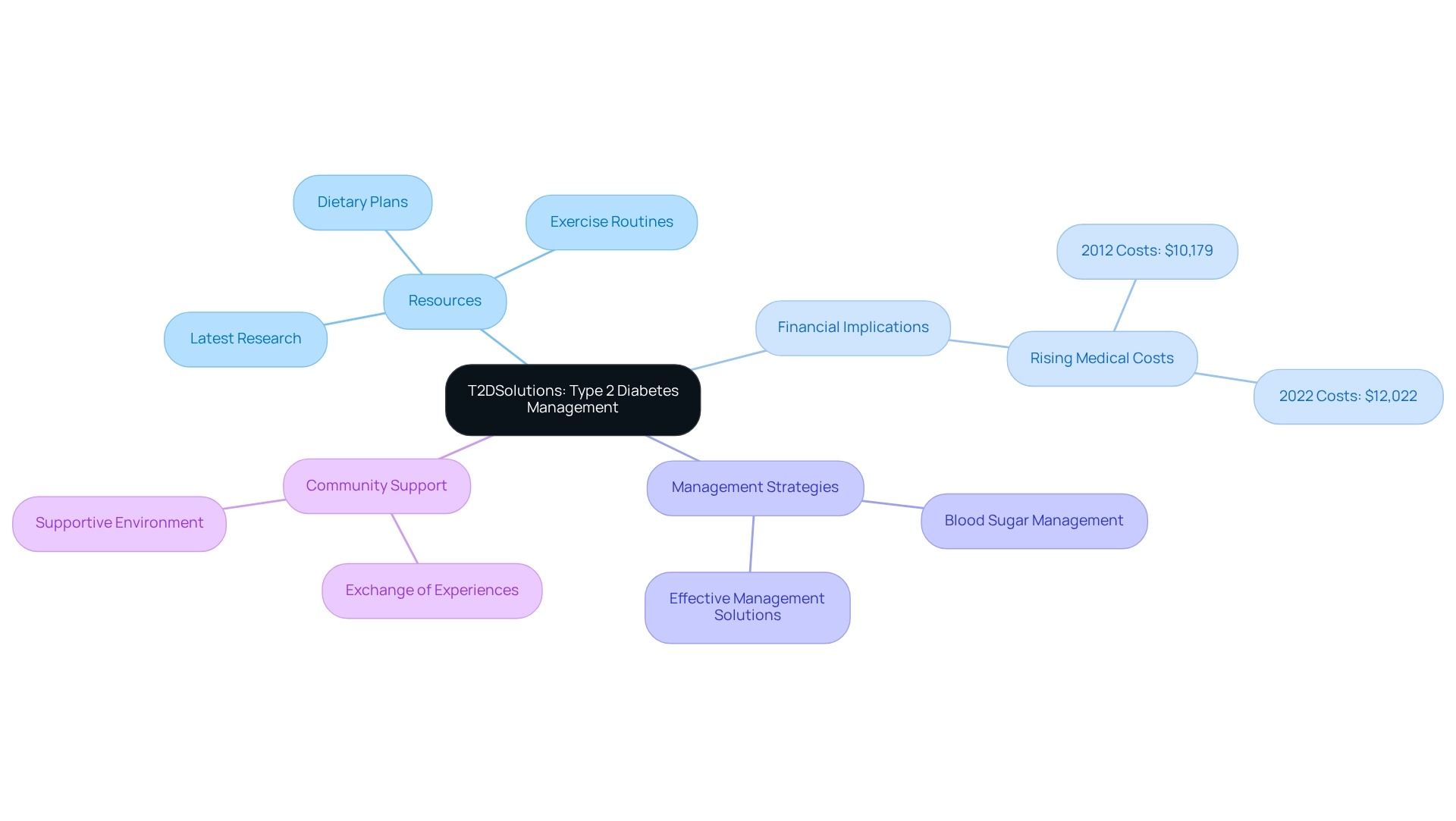
Understanding Type 2 Diabetes: Definition and Importance
Type 2 Diabetes is a chronic condition that can feel overwhelming, marked by insulin resistance. This means the body struggles to use insulin effectively, leading to elevated blood sugar levels. It’s important to recognize that this condition is widespread, affecting over 252 million individuals who remain undiagnosed worldwide. Early identification is crucial—prompt diagnosis and treatment can significantly enhance quality of life and reduce the risk of serious complications like cardiovascular issues, kidney failure, and neuropathy.
As we look ahead to 2025, the global wellness landscape reveals a concerning trend: the incidence of Type 2 Diabetes continues to rise. The Global Burden of Disease Study highlights that diabetes-related illness and death have escalated across 204 nations from 1990 to 2021. This underscores the urgent need for effective public welfare strategies. Understanding this condition and obtaining information on type 2 diabetes is vital for patient education, empowering individuals to make informed choices about their health. The World Health Organization emphasizes the need for coordinated actions against the diabetes epidemic to improve global health systems. This perspective highlights the importance of comprehensive information on type 2 diabetes, which not only aids in early identification but also enables patients to manage their condition proactively. By fostering awareness and understanding, we can work together to lessen the global burden of this chronic disease. Remember, you’re not alone in this journey, and there are resources available to support you every step of the way.
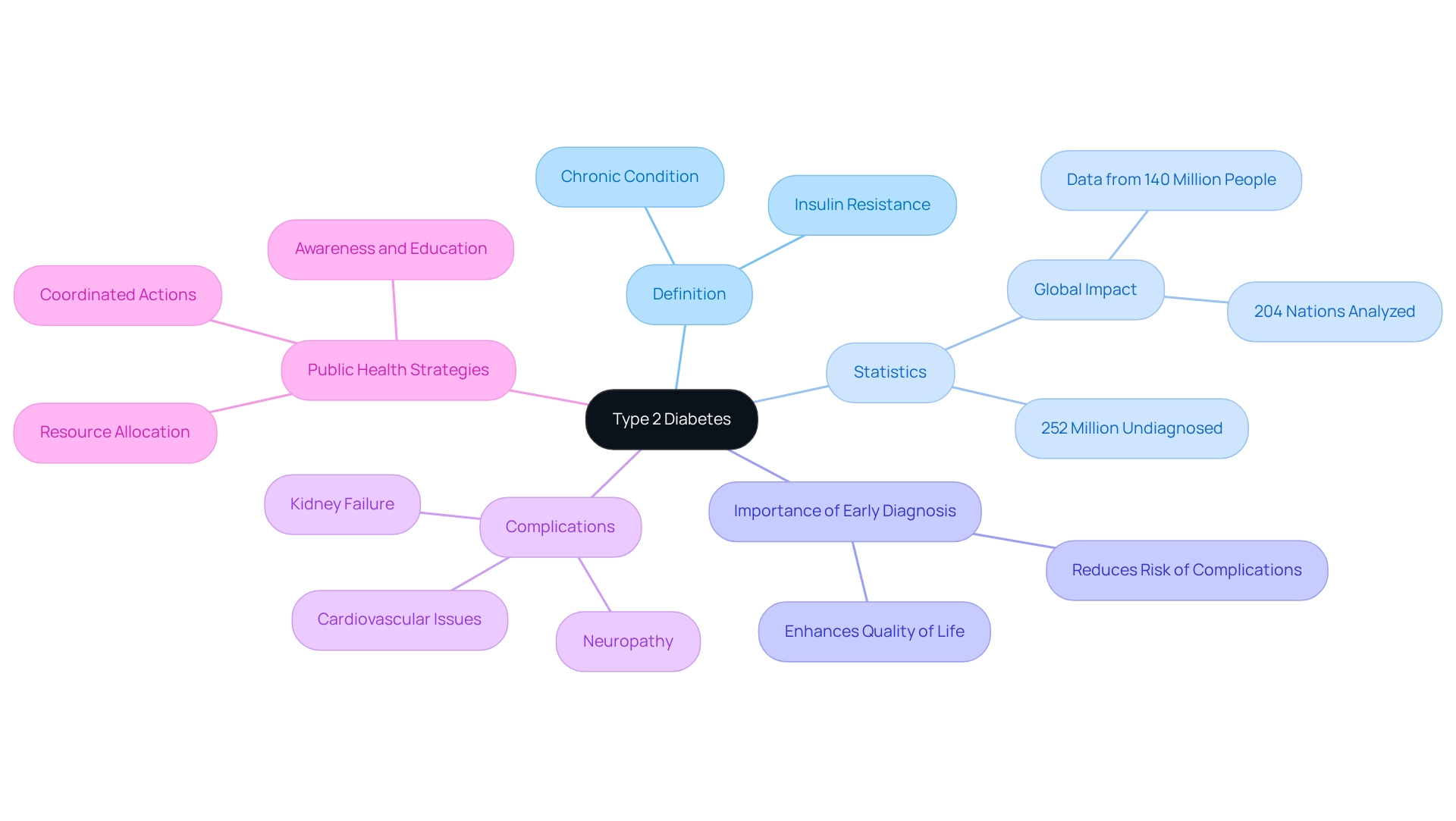
Causes of Type 2 Diabetes: Key Risk Factors to Consider
Several significant risk factors contribute to the onset of type 2 diabetes, including:
- Obesity
- A sedentary lifestyle
- Age
- Family history
- Certain ethnic backgrounds
It's concerning to note that obesity is a major factor, with about 8.0% of U.S. adults diagnosed with diabetes showing non-HDL cholesterol levels of 190 mg/dL or higher. This highlights a strong connection between excess weight and diabetes risk. In our fast-paced world, the prevalence of physical inactivity exacerbates this issue, as it is a crucial contributor to obesity and leads to the need for information on type 2 diabetes. Recognizing these risk factors is essential for empowering individuals to make informed lifestyle changes. Regular health screenings are vital, as healthcare professionals can evaluate one's risk based on weight and other health indicators. Research consistently demonstrates that lifestyle modifications, such as increasing physical activity and making healthier dietary choices, can significantly reduce the risk of developing type 2 diabetes.
Community support is invaluable on this journey. Personal stories reveal that individuals who connect with supportive networks are more likely to embrace healthier habits, fostering resilience and enhancing their overall quality of life. As the prevalence of type 2 diabetes continues to rise across diverse racial and ethnic groups, providing information on type 2 diabetes and addressing these risk factors through education and community engagement becomes increasingly important. By prioritizing lifestyle changes and utilizing available resources, you can take proactive steps toward preventing type 2 diabetes. Remember, you're not alone in this journey; we are here to support you every step of the way.
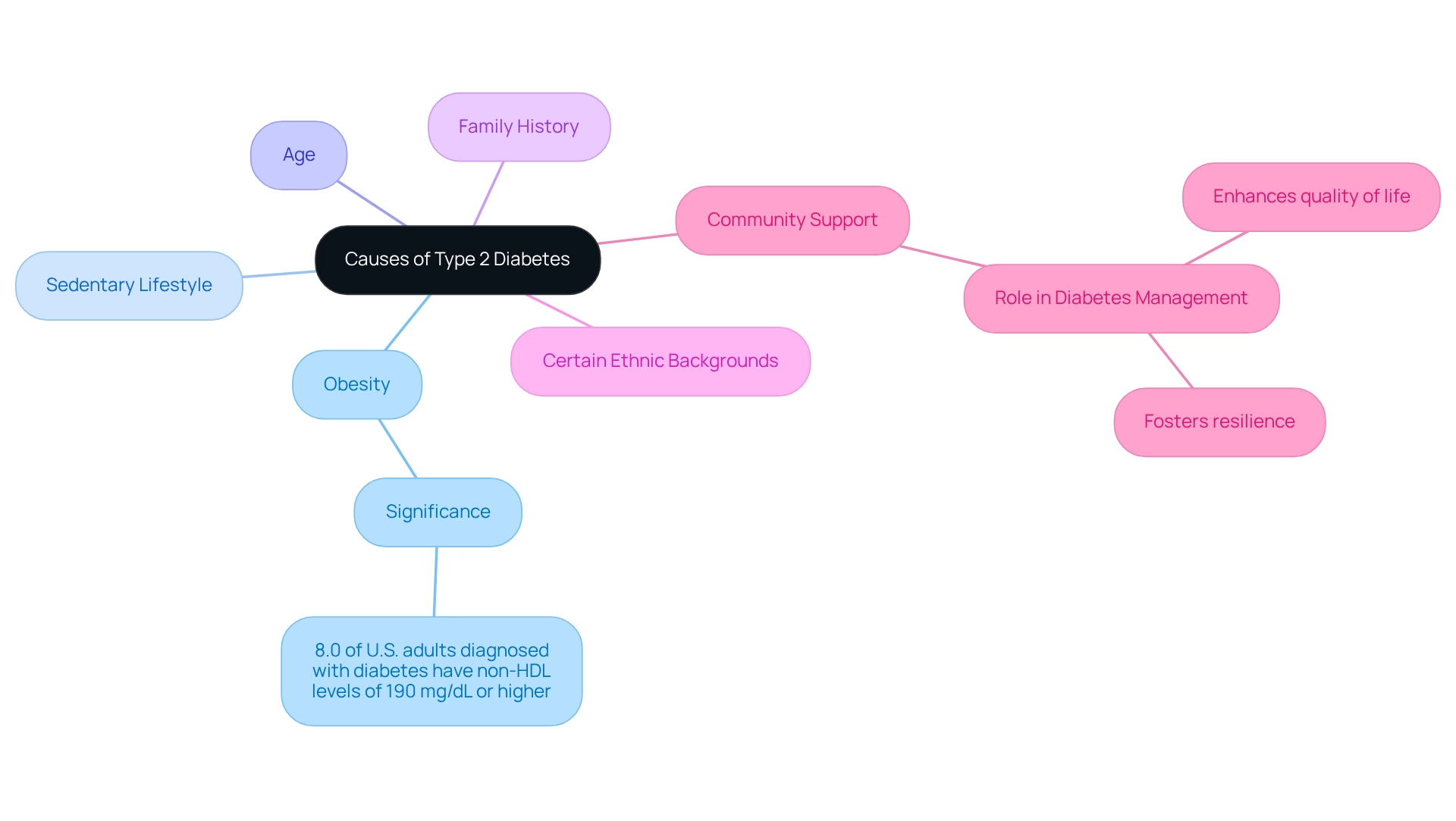
Recognizing Symptoms of Type 2 Diabetes: Early Signs to Watch For
It is crucial to recognize the symptoms of Type 2 Diabetes to gather information on type 2 diabetes, which is essential for early diagnosis and effective management. Common signs include:
- Increased thirst
- Frequent urination
- Extreme hunger
- Fatigue
- Blurred vision
- Slow-healing sores
It's understandable that many patients overlook these symptoms, which can lead to delays in seeking necessary medical intervention. For instance, individuals often report increased thirst and fatigue before reaching out for help. This highlights the importance of greater awareness and understanding of one's body.
Healthcare providers emphasize the significance of early detection to prevent serious complications. If you experience any of these symptoms, please consult a healthcare professional. You're not alone in this journey; many have walked this path before you, and support is available. T2DSolutions offers valuable educational resources, including guides and tools, as well as information on type 2 diabetes, to assist newly diagnosed patients in recognizing these early signs. By utilizing these resources, you can take proactive steps towards managing your well-being. Remember, we are here to support you every step of the way, helping you enhance your quality of life and navigate your health management journey effectively.
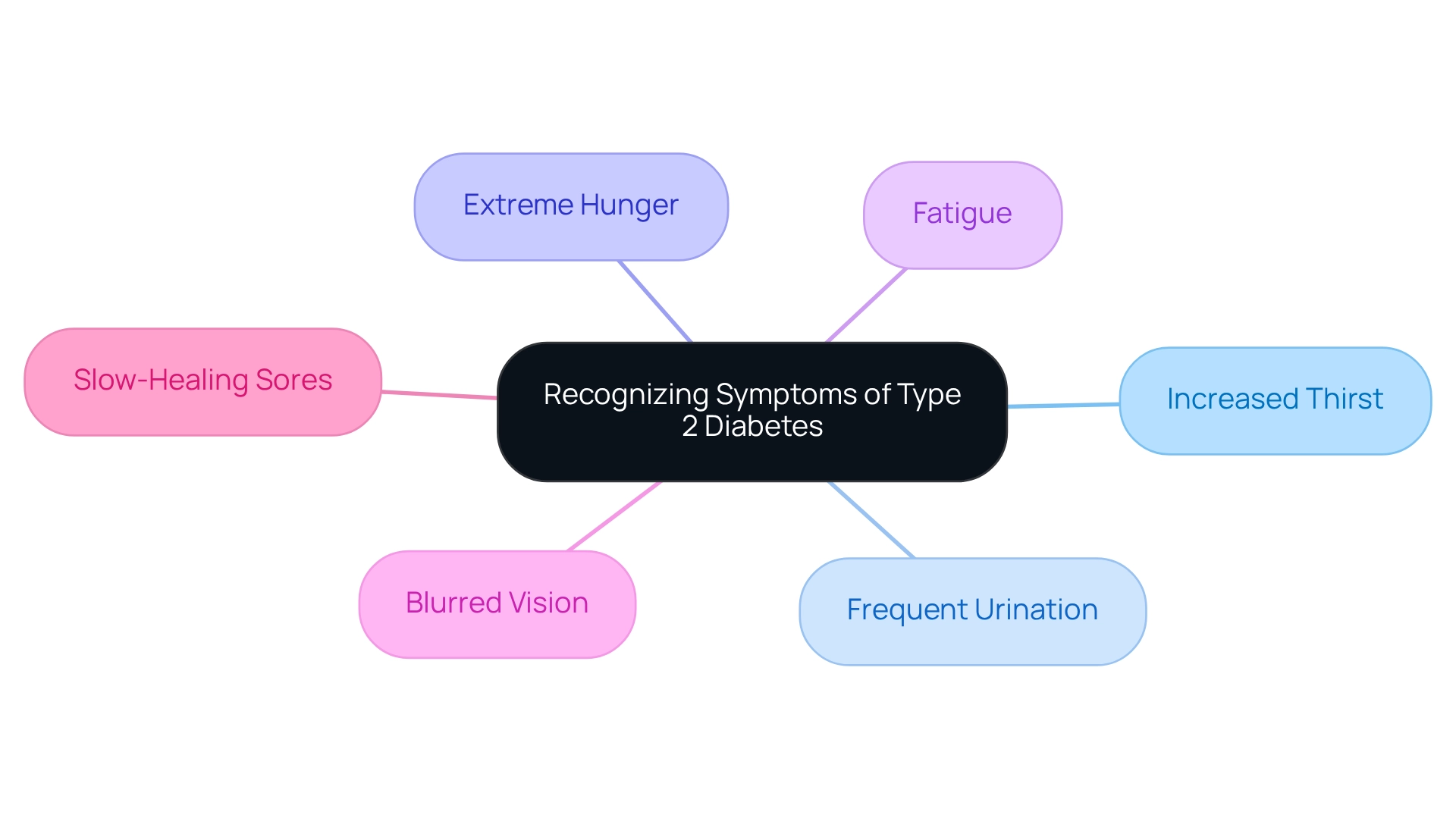
Diagnosing Type 2 Diabetes: Tests and Criteria Explained
While diagnosing Type 2 Diabetes can feel overwhelming, gathering information on type 2 diabetes involves a series of tests that help assess blood glucose levels and overall metabolic health. One crucial element is the A1C test, where a result of 6.5% or higher may suggest the presence of the condition. This test reflects average blood sugar levels over the past two to three months, making it a reliable indicator for diagnosis.
Additionally, the fasting plasma glucose test and the oral glucose tolerance test are frequently utilized to verify blood sugar issues, and it is important to seek information on type 2 diabetes, especially for individuals at increased risk, such as those with a family history of diabetes, obesity, or inactive lifestyles.
The National Institute of Digestive and Kidney Diseases (NIDDK) emphasizes that early detection can greatly enhance management outcomes, and you are not alone in this journey, as recent updates in 2025 provide crucial information on type 2 diabetes, highlighting the importance of understanding factors that can lead to inaccurately high A1C results, such as different forms of anemia and specific medications. For instance, conditions like iron-deficiency anemia can skew results, potentially leading to misdiagnosis. Healthcare professionals advocate for comprehensive evaluations that consider these variables when interpreting A1C levels. It's understandable to feel concerned about these factors, but rest assured that your healthcare team is there to support you.
Statistics show that small changes in temperature, equipment, or sample handling can affect blood glucose measurements, underscoring the need for precise testing protocols. Registered dietitians also play a crucial role in managing blood sugar conditions, assisting patients in developing customized meal plans that align with their health objectives. They ensure that dietary selections promote blood sugar regulation and overall wellness, reinforcing that you have a support system in place.
In conclusion, having information on type 2 diabetes, as well as comprehending the criteria for diagnosis, including A1C levels and the importance of routine screenings, is vital for effective management and improved health results. Remember, you are not alone, and we are here to support you every step of the way.
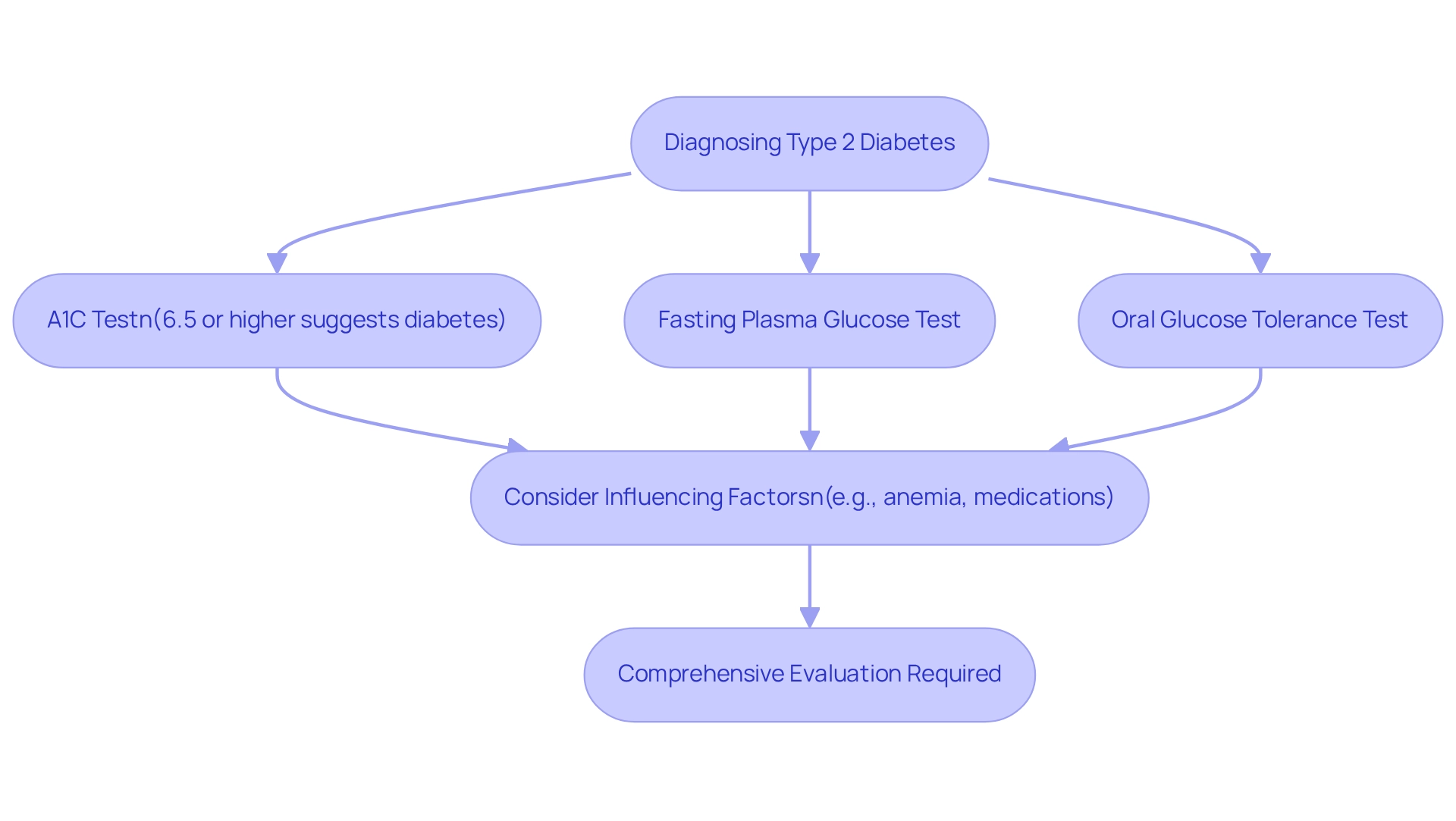
Managing Type 2 Diabetes: Strategies for Effective Control
At T2DSolutions, we understand the challenges you face while managing your health with information on type 2 diabetes. It’s important to approach this journey with compassion and a holistic mindset. Effective management of T2 requires a blend of lifestyle changes, strict adherence to medication, and consistent monitoring of your blood sugar levels. Here are some key strategies that may help:
-
Balanced Diet: Embracing a nutritious diet filled with whole foods, vegetables, and lean proteins can greatly influence your blood sugar control. Research shows that individuals who follow structured dietary plans often experience improved management outcomes. Remember, you’re not alone in this; many have found success by making mindful dietary choices.
-
Regular Physical Activity: Aim for at least 150 minutes of moderate exercise each week. This can enhance your insulin sensitivity and assist in weight management—both essential for maintaining healthy blood sugar levels. It’s understandable to feel overwhelmed, but even small steps can lead to significant improvements.
-
Stress Management: Managing stress is crucial, as it can adversely affect your blood sugar levels. Techniques like mindfulness, yoga, or meditation can be beneficial. Consider exploring these practices to find what resonates with you.
-
Personalized Management Plans: Collaborate closely with your healthcare provider to create a management plan tailored to your needs. Regular discussions about your progress and any necessary adjustments to your medications can make a difference in your health journey.
Recent data indicates that 8.0% of adults with diagnosed conditions have non-HDL cholesterol levels exceeding 190 mg/dL. This underscores the importance of thorough monitoring of your overall well-being. Additionally, case studies reveal that personalized management plans for blood sugar control lead to better adherence rates and improved health outcomes. By focusing on these effective strategies, you can take proactive steps toward managing your condition and enhancing your quality of life. For more information on type 2 diabetes and support, we invite you to visit T2DSolutions—your complete resource for information on type 2 diabetes education and community support. Remember, you are not alone in this journey; we are here to support you every step of the way.
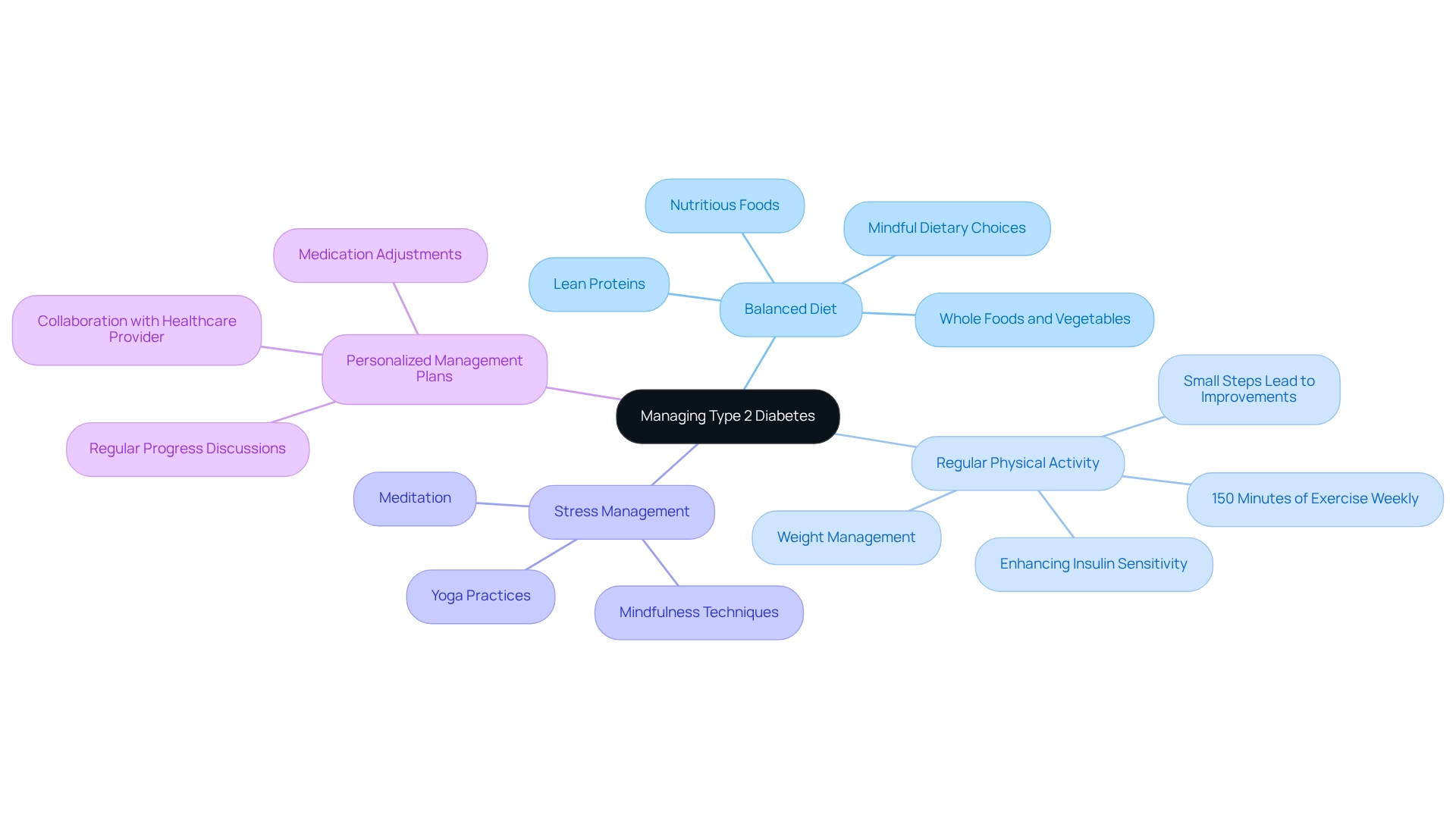
Dietary Considerations for Type 2 Diabetes: Foods to Include and Avoid
Effectively managing this condition requires information on type 2 diabetes, emphasizing a balanced diet rich in non-starchy vegetables, whole grains, lean proteins, and healthy fats. These food categories not only promote general well-being but also play a vital role in stabilizing blood sugar levels. It's understandable to feel overwhelmed by the dietary changes. Therefore, it’s essential to limit or avoid sugary snacks, refined carbohydrates, and high-fat meats, which can exacerbate insulin resistance and lead to spikes in blood glucose.
Portion control and meal timing are vital components of a successful dietary strategy. Studies suggest that dietary interventions can greatly affect the burden of the condition associated with high blood sugar, as supported by information on type 2 diabetes. Long-term research reveals a rise in diet-related burdens from 1990 to 2018, highlighting the necessity for flexible dietary approaches as populations mature and expand. Remember, you are not alone in this journey.
For individuals making dietary decisions, seeking advice from a licensed nutritionist can provide customized suggestions suited to personal wellness requirements. This professional guidance is invaluable in developing successful meal planning strategies that align with diabetes management goals by providing critical information on type 2 diabetes. Nutritionists stress the significance of recognizing which foods to steer clear of, emphasizing that knowledgeable dietary decisions can lead to better health outcomes.
Including a range of foods while being cautious of those to avoid can assist in sustaining stable blood sugar levels. Ultimately, this approach can improve your quality of life as you manage chronic glucose conditions. We are here to support you every step of the way.
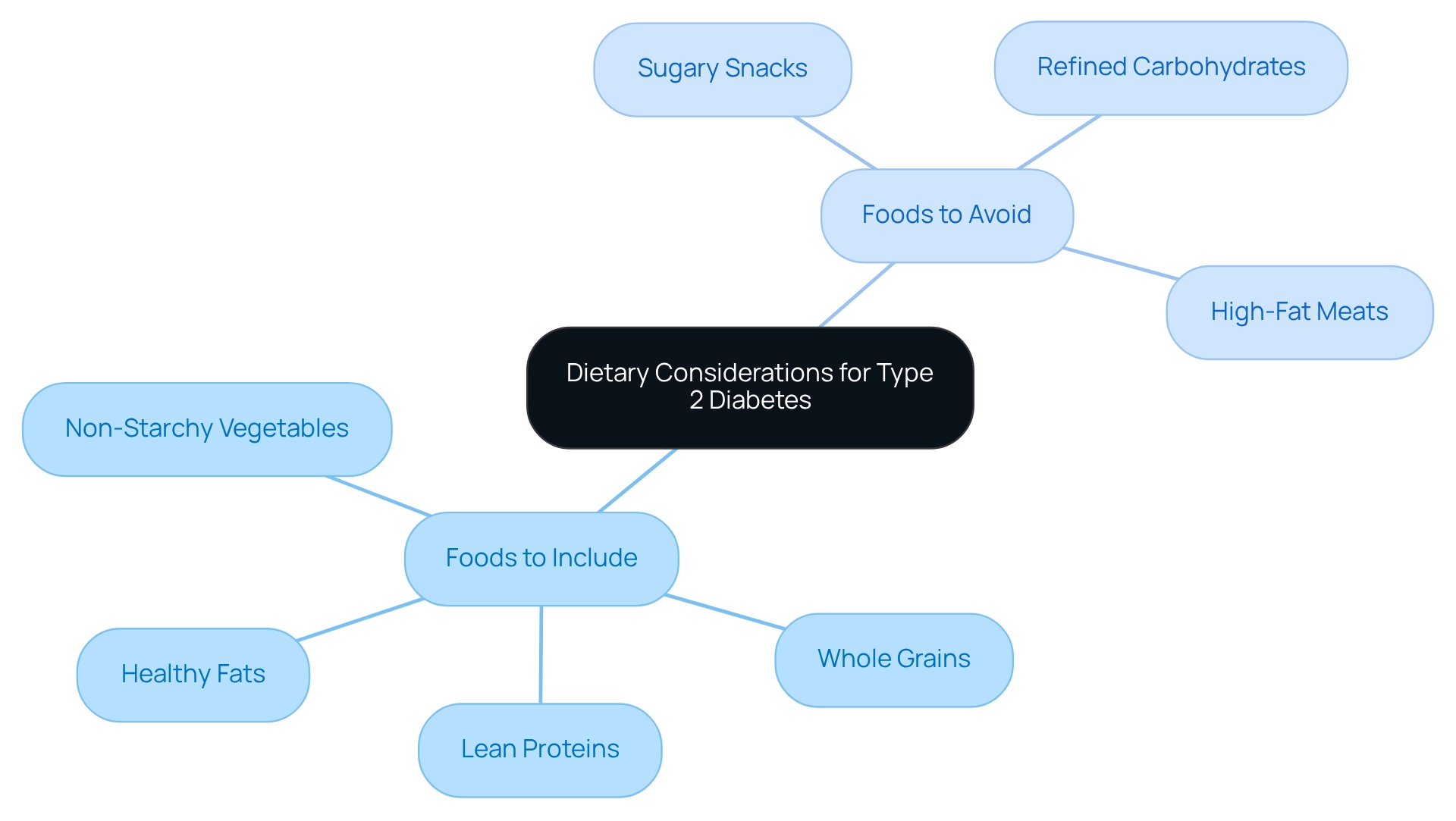
Exercise and Type 2 Diabetes: Benefits and Recommendations
Participating in consistent physical exercise is essential for successfully managing Type 2 diabetes. It enhances insulin sensitivity, aids in weight control, and helps lower blood sugar levels. The American Diabetes Association recommends a minimum of 150 minutes of moderate-intensity aerobic exercise each week, complemented by resistance training at least twice weekly.
At T2DSolutions, we provide information on type 2 diabetes and understand the challenges faced by newly diagnosed patients, while activities such as walking, swimming, and cycling are particularly beneficial. It’s understandable to feel overwhelmed, but to support your journey, consider starting with small, manageable goals, such as a daily 10-minute walk. Gradually increasing your activity level can make a significant difference.
Real-world examples illustrate the positive impact of structured exercise programs. For instance, individuals in high-intensity interval training (HIIT) groups observed an average weight reduction of 1.3 kg compared to control groups, highlighting the efficacy of targeted physical activity in managing blood sugar levels. This weight loss is significant, especially considering the economic burden this condition places on individuals and healthcare systems. It emphasizes exercise as a cost-effective management strategy.
Additionally, a recent meta-analysis emphasized that HIIT programs significantly improve glucose regulation and insulin resistance, outperforming traditional aerobic training. Experts highlight that exercise not only aids physical fitness but also enhances mental well-being, making it an essential element of diabetes management. Therefore, consulting a healthcare provider before initiating new or more challenging physical activities is crucial to ensure safety and effectiveness.
By incorporating physical activity into everyday practices, individuals with Type 2 diabetes can improve their overall well-being and quality of life. Remember, you’re not alone in this journey. T2DSolutions is here to provide resources and community support, including information on type 2 diabetes, to help you remain motivated on your path to improved well-being.
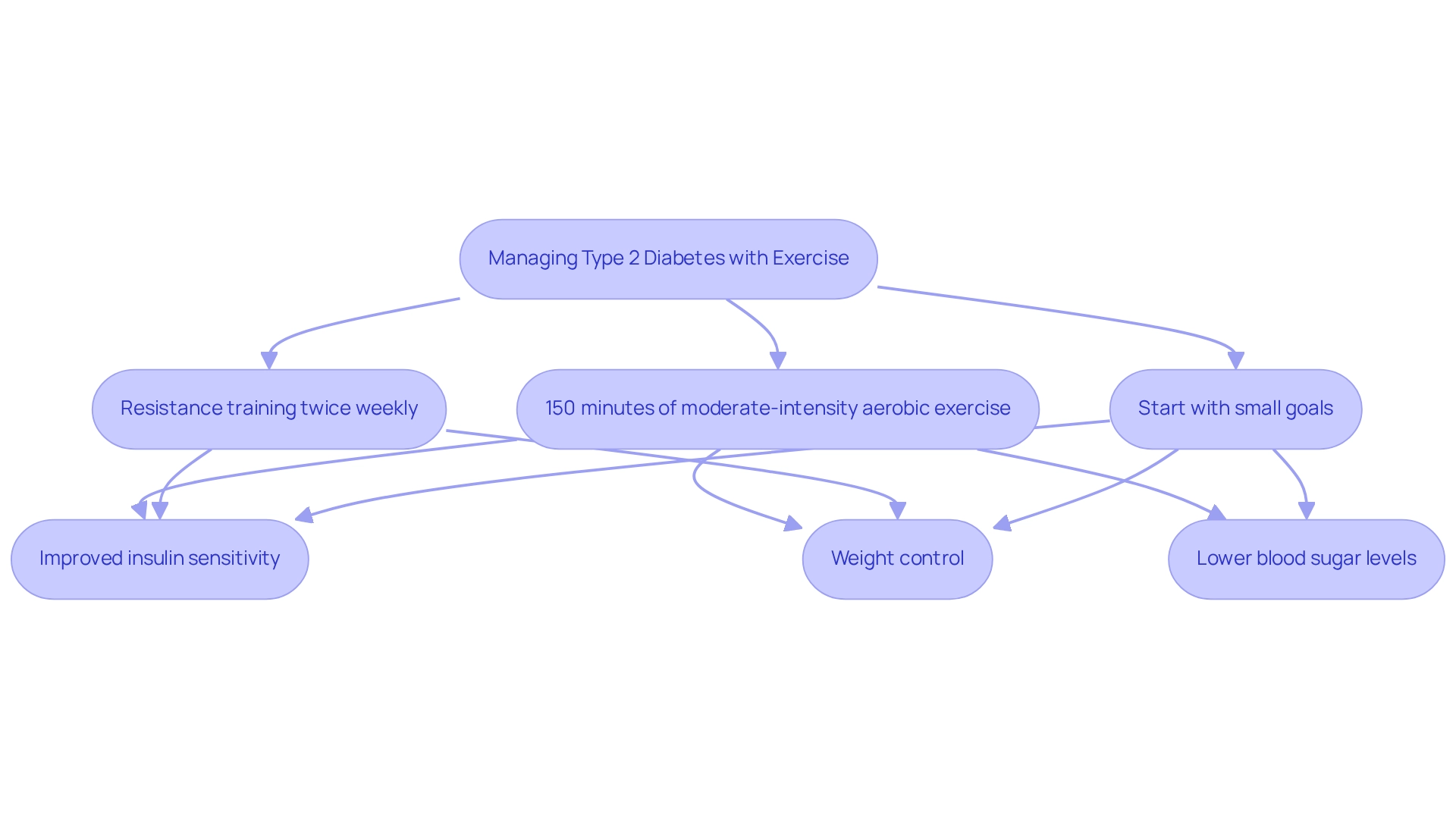
Complications of Type 2 Diabetes: Understanding the Risks
Unmanaged Type 2 Diabetes can lead to serious health risks, and seeking information on type 2 diabetes is crucial to understanding these risks, which include:
- cardiovascular disease
- kidney damage
- nerve damage
- vision problems
It's concerning to note that individuals with this condition face significantly higher medical expenses, with costs rising from $8,417 in 2012 to $9,601 in 2017. This highlights the financial strain that complications can impose. Moreover, those with high blood sugar are two to four times more likely to develop heart disease compared to those without the condition, which is a critical concern.
Understanding the importance of regular monitoring is vital. Routine check-ups with healthcare providers can help detect potential complications early, allowing for timely interventions. For instance, consider how short-term lifestyle choices might not seem harmful but can lead to complacency regarding long-term risks. Continuous engagement and education are essential in effectively managing these risks.
Expert insights reinforce the need for proactive management. Healthcare providers emphasize that regular monitoring and lifestyle adjustments are crucial in preventing complications associated with the information on type 2 diabetes. Real-life examples show how effective monitoring can significantly reduce the risk of complications. This reinforces the idea that informed and engaged patients can achieve better wellness outcomes. By recognizing these risks and the value of regular check-ups, you can take charge of your health and lessen the long-term effects of diabetes.
As T2DSolutions evolves, more resources and community support will be available to help newly diagnosed patients manage their condition effectively. To establish a routine for regular monitoring, consider setting reminders for check-ups and tracking your wellness metrics daily. Remember, you're not alone in this journey—we are here to support you every step of the way.
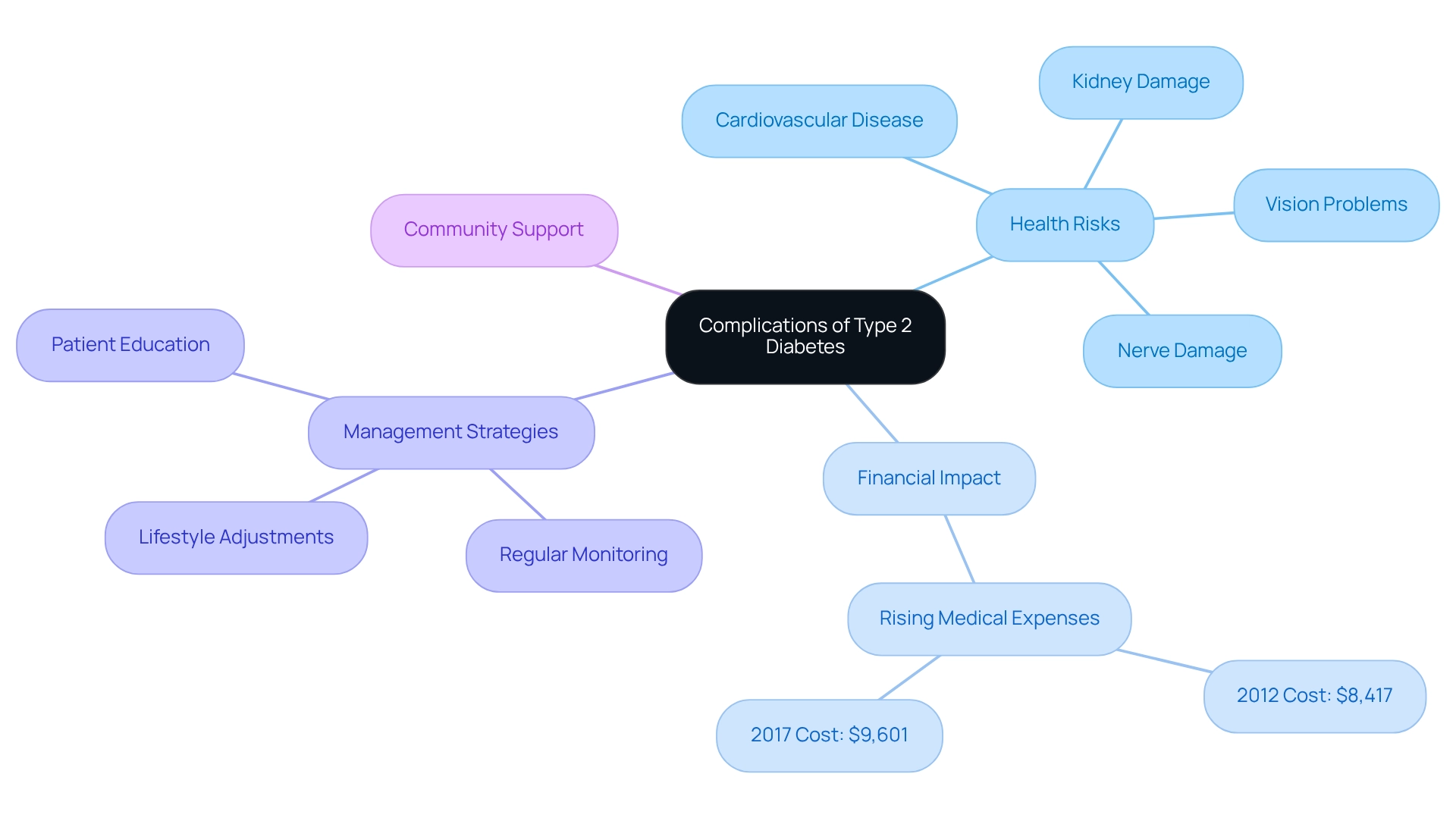
Emotional Well-being and Type 2 Diabetes: Coping Strategies and Support
Managing a chronic blood sugar condition can be emotionally challenging. It's completely understandable to experience feelings of stress, anxiety, or depression during this journey. Research indicates that around 30% of individuals with chronic illnesses face anxiety and depression, underscoring the importance of mental wellness interventions.
Coping strategies can make a significant difference. Seeking support from healthcare providers, joining support groups, and practicing stress-reduction techniques such as mindfulness and exercise are all valuable options. A recent study emphasized the need for interventions that address anxiety and depression in both patients and caregivers, highlighting the urgency of this issue.
Maintaining open communication with loved ones about your feelings and challenges can provide essential emotional support. Remember, you’re not alone in this journey. As John Landry, a Registered Respiratory Therapist, beautifully puts it, "Let these words inspire you to continue the fight and embrace every day with hope and positivity."
By fostering resilience and encouraging positive coping mechanisms, you can better navigate the emotional landscape with the information on type 2 diabetes. This ultimately leads to improved health outcomes and a higher quality of life. We are here to support you every step of the way.
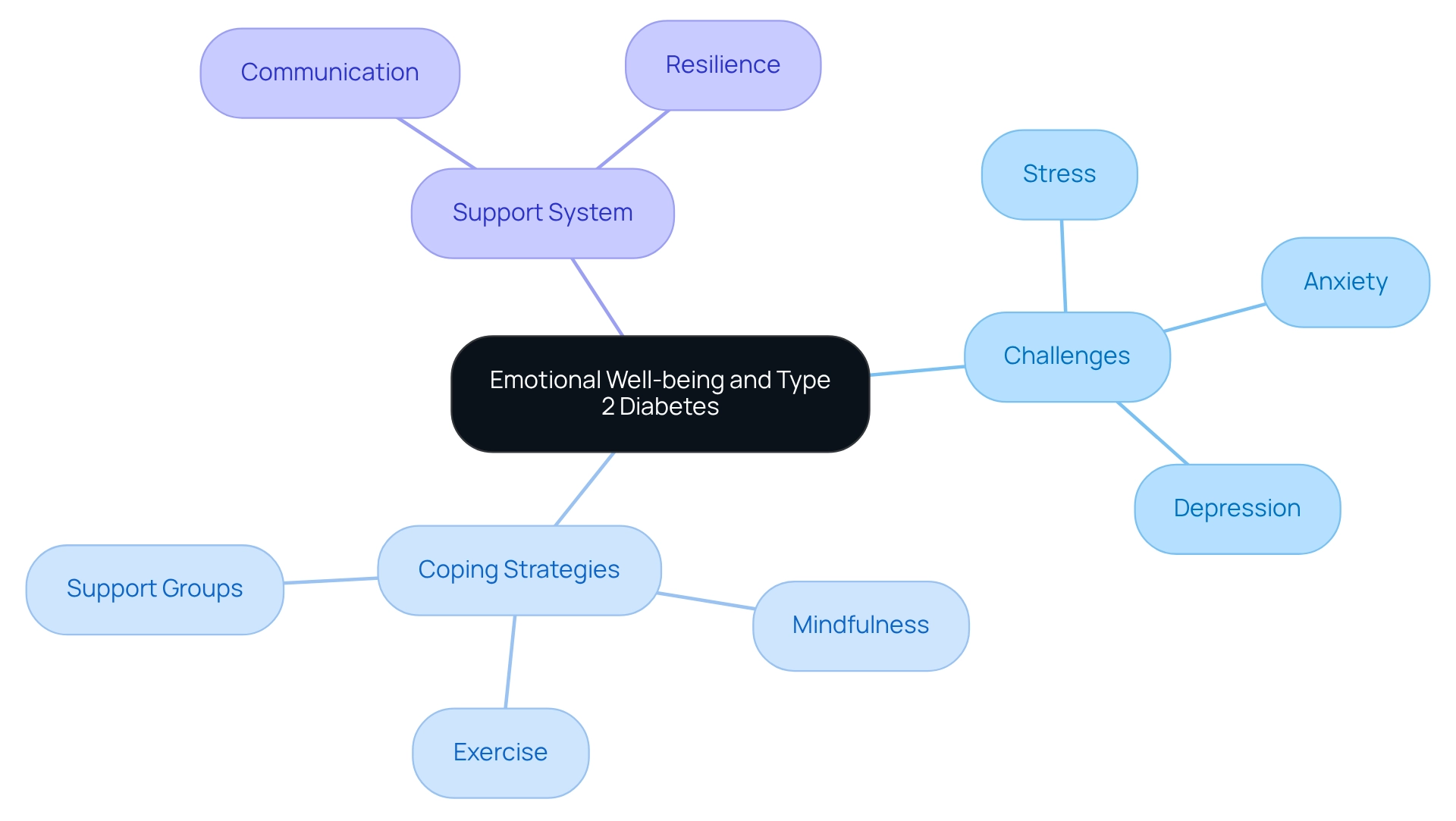
Conclusion
Understanding and managing Type 2 Diabetes is a multifaceted journey that requires education, community support, and proactive health management. At T2DSolutions, we provide a comprehensive resource center designed to empower you and your family with vital information and effective strategies for managing this chronic condition. By addressing the complexities of Type 2 Diabetes—from recognizing symptoms and understanding risk factors to implementing dietary changes and engaging in physical activity—you are better equipped to take control of your health.
The importance of early detection and continuous monitoring cannot be overstated. Regular health screenings and awareness of the signs and symptoms of diabetes are crucial for timely intervention. This proactive approach can significantly enhance your quality of life and prevent severe complications. Furthermore, fostering a supportive community allows you to connect with others facing similar challenges, bolstering motivation and resilience.
By prioritizing education, personalized management plans, and emotional well-being, T2DSolutions aims to create an inclusive environment where you feel supported in your diabetes management journey. Our commitment to providing tailored resources and strategies ensures that you are not alone in your struggles. As awareness and understanding of this condition grow, so too does the potential for improved health outcomes and a more informed public. Together, we can navigate the complexities of Type 2 Diabetes and work towards a healthier future. Remember, you're not alone in this journey; we are here to support you every step of the way.
Frequently Asked Questions
What is T2DSolutions?
T2DSolutions is a comprehensive resource center dedicated to providing information and community support for individuals recently diagnosed with type 2 diabetes. It aims to empower individuals and families by offering tailored information and effective management strategies.
What resources does T2DSolutions provide for managing type 2 diabetes?
T2DSolutions offers a wealth of information on type 2 diabetes, including dietary plans, exercise routines, insights into the latest medical research, and strategies for optimal care management.
Why is early identification of type 2 diabetes important?
Early identification and treatment of type 2 diabetes can significantly enhance quality of life and reduce the risk of serious complications such as cardiovascular issues, kidney failure, and neuropathy.
What are the financial implications of type 2 diabetes?
The financial burden of type 2 diabetes is significant, with excess medical costs per person rising from $10,179 in 2012 to $12,022 in 2022. Effective management solutions are emphasized to help navigate these costs.
What are the main risk factors for developing type 2 diabetes?
Significant risk factors for type 2 diabetes include obesity, a sedentary lifestyle, age, family history, and certain ethnic backgrounds.
How does obesity relate to type 2 diabetes?
Obesity is a major factor in the development of type 2 diabetes, with a notable percentage of U.S. adults diagnosed with diabetes showing high non-HDL cholesterol levels, indicating a strong connection between excess weight and diabetes risk.
What role does community support play in managing type 2 diabetes?
Community support is invaluable, as individuals who connect with supportive networks are more likely to adopt healthier habits, fostering resilience and improving their overall quality of life.
What steps can individuals take to prevent type 2 diabetes?
Individuals can take proactive steps to prevent type 2 diabetes by prioritizing lifestyle changes such as increasing physical activity, making healthier dietary choices, and utilizing available resources for education and support.



